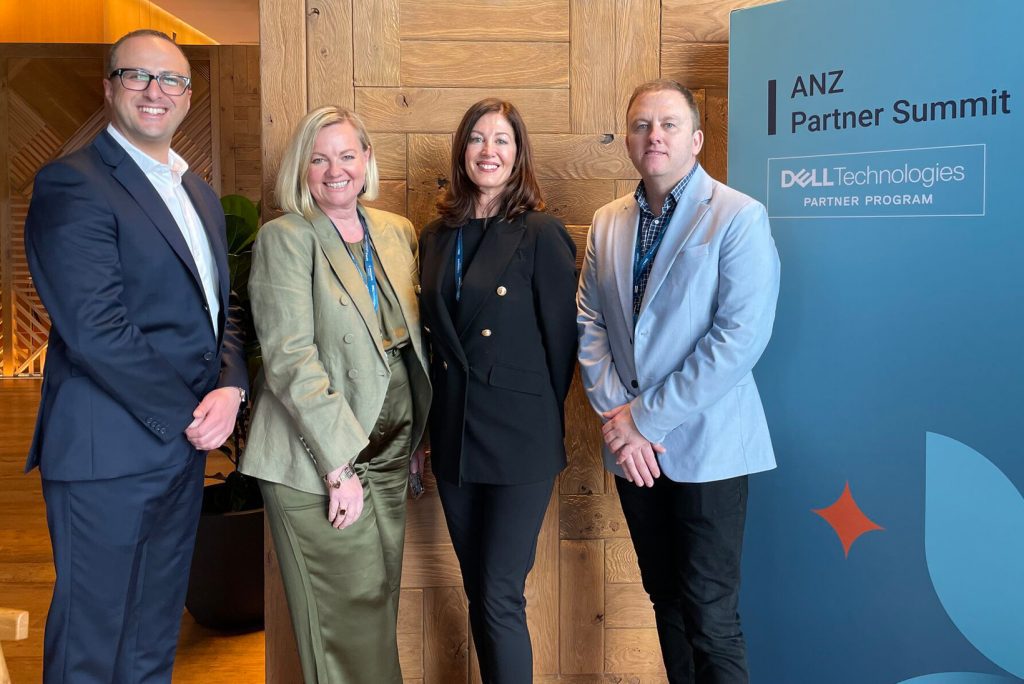October 16, 2023
Dell Technologies is joining forces with skilled and committed partners to take control of modernisation projects across Australia and New Zealand (A/NZ), mobilising an expansive ecosystem to capitalise both technically and commercially.
Whether CompNow, Datacom, Infront Systems, NCS or The Missing Link – to name but a few – the technology giant is building a conveyor belt of local expertise in the pursuit of aggressive market growth. This is the product of many years of partnership and investment, culminating in a network of specialists taking the lead on customer deployments from the data centre to the cloud.
In parallel, channel capabilities are being built in the areas of artificial intelligence (AI) and edge computing, notable areas of emerging interest once modernisation work evolves into innovation briefs.
“Competition is back,” said Shant Soghomonian, Senior Director and General Manager of Channel Sales A/NZ at Dell. “Partners are focused on profitability and building recurring revenues. Market demand is increasing for their services while they also assess what the future looks like in terms of the bets that they should place.”

Following the chaos of COVID-19 and debilitating supply chain issues, Soghomonian observed that the market is as close to normal in terms of returning to the levels of 2019.
Yes, customers have been investing cautiously during the past six months with decisions delayed and spend scrutinised but overall, the channel is well-positioned to capitalise on projected single-digit market growth during the next 12 months.
“Customers continue to modernise and invest in on-premises cloud environments which is creating a huge focus from partners on hybrid cloud and multi-cloud,” Soghomonian noted.
This market dynamic – in which local spending in the data centre is expected to rebound – represents fertile ground for the channel to align with Dell’s new Partner First Strategy for Storage. Effective early August, more than 99% of Dell customers and potential customers are now considered “partner first for storage”.
“Our partners are critical in driving, modernising, deploying and managing modernised cloud environments for customers so that’s the initial focus,” Soghomonian shared. “We want to expand our reach and capability through the channel.”
With an expectation of acquiring new partners and customers also, Soghomonian said the strategy is centred on four core principles:
“We want to win in the data centre with our partners and the feedback has been very positive so far from our channel,” Soghomonian added.
Locally built private cloud capacity
Armed with this new strategy – and buoyed by a market committed to enhancing IT infrastructure – Dell is doubling down on the hybrid cloud and multi-cloud opportunity across A/NZ, underpinned by a channel-centric approach.
“That’s still the largest opportunity for our partner base,” Soghomonian confirmed. “We’re winning with partners every day in the modernisation of on-premises private cloud environments.
“If you look at the ongoing people and skills shortage problem, customers have lost some of that capability also so they’re looking to partners to take them on their cloud journey, which is focused on hybrid cloud and multi-cloud. Part of that journey includes the modernisation of existing or new on-premises private cloud environments and we’re winning a number of great projects in that area.”
An end-user mandate to modernise is also mirrored at an ecosystem level with partners ramping up plans to either launch or relaunch in-house private cloud capabilities.
“We’re seeing that reinvestment,” Soghomonian said. “Many partners had this capability but hadn’t modernised for a long period of time.
“Competition is back. Partners are focused on profitability and building recurring revenues”
“Our service provider partners buy the infrastructure and build these capabilities so naturally, they want to sweat the assets and just add capacity for as long as possible to make money. That has resulted in approximately a 7-10 year cycle with partners now starting to modernise those environments once again.”
Modernisation includes the deployment of “brand-new” architecture and a strong services value proposition built on top, as the channel capitalises on evolving cloud and business model requirements.
“Hybrid cloud and multi-cloud is real,” Soghomonian shared.
“There was also a huge spike in public cloud and that continues but customers are now assessing workloads and applications and seeking the most cost-effective, performance-based approach. The demand on our partners to have that capability is there alongside an increased focus on building higher recurring revenue models.”
Translating end-user expectations into partner priorities, Soghomonian referenced the work of The Missing Link and CompNow – two leading partners within the Dell ecosystem – in locally building private cloud capacity to met demand.
One such example is SmartCLOUD, which is owned and operated by The Missing Link. The multi-million-dollar solution represents a significant investment by the Sydney-based business and runs as a private cloud hosted locally in Australian data centres.
Built leveraging technologies from Dell, VMware, Cisco and Equinix among others, the platform aims to deliver enhanced infrastructure-as-a-service (IaaS) and platform-as-a-service (PaaS) resources in a customised and flexible manner.
One customer already maximising the product is a medical imaging organisation which required a reliable platform to run a mission-critical application that was unpredictable in nature.
“This is a tier-1 application that can’t go down,” explained Alex Gregory, Pre-sales Consultant at The Missing Link. “A key factor was that through SmartCLOUD, the application would be running locally in Australia – they knew where the data was and this helped from a disaster recovery standpoint also.
“Everything that they expected and needed to deliver as an organisation was addressed by SmartCLOUD which ticked all of those boxes.”
According to Gregory – addressing customers via the The Missing Link’s official podcast – SmartCLOUD was built to tackle rising end-user challenges in relation to skills, with organisations struggling to run and resource in-house IT environments.
In response, businesses are favouring increased flexibility when leveraging IT services as agility and cost control dominate discussions.

“This organisation didn’t have a huge IT team or a huge budget but because this application has to be running 24/7, having a team of people from The Missing Link behind the technology was a big feature,” Gregory added.
Meanwhile, Melbourne-based CompNow recently invested in the company’s first hybrid cloud offering, powered by APEX technologies.
Under the banner of CompNow Cloud, the offering is designed to provide “object-based, locally built and supported storage” to organisations via a “cost effective and flexible package”.
“This enables our clients to access the best possible opportunities for IT success and growth,” said Andrew Charles, Director of Government, Commercial and Enterprise at CompNow. “That’s by leveraging our intimate knowledge and relationships across Dell’s entire business.”
During the past seven years, CompNow has been structuring business capabilities to design and deliver complex solutions across the entire Dell portfolio, spanning PowerStore, PowerEdge and PowerScale product lines.
“This has resulted in some great wins with Dell’s market-leading VxRail technology, particularly in the local government sector,” added Charles, speaking on CompNow’s official YouTube channel.
“Most recently, we’ve been gearing up our business to offer APEX solutions in market from both a private and public cloud perspective. Our journey with Dell continues to grow from strength to strength.”
Ecosystem embraces new tech
Magnified end-user focus on modernisation projects is not to the detriment of innovation plans however, rather acting as fuel to accelerate transformation agendas when the time is right. In that sense, the channel is carrying out necessary foundational work to pave the way for emerging technologies such as AI.
According to Michael Dell – Chairman and CEO of Dell – AI has the potential to not only “transform” industries but also how society lives and works.
“The amount of data is exploding,” he said, via a recent post on LinkedIn. “The value of that data is also increasing, especially when we activate it with powerful innovations like AI. If you’re curious and like to learn, there has never been a better time to be alive, to make yourself and your organisation smarter and more productive.”
On the topic of AI in a local context – an issue which has captured the corporate and consumer imagination in equal measure – Soghomonian acknowledged that the industry currently remains “at the bottom of the curve” from a capability and addressable market perspective.
But as adoption rates naturally increase during the next 12-24 months, expect the ecosystem to follow suit.
“The market hasn’t taken off yet but we already understand the services and capabilities that partners will need,” Soghomonian said.
“We’re winning with partners every day in the modernisation of on-premises private cloud environments”
“A lot of actions are still within traditional infrastructure in terms of powering AI and having the specialised skills available to run and aggregate the data. Then, above the stack, there’s a whole lot of other skills around data science and training models that partners will need to consider.”
For Soghomonian, partners already possess that foundational element in terms of understanding data – “some of our partners have that skill better than anyone in market”.
“We have partners capable of running the full stack but perhaps they are either going to focus on doing the data and AI model element very well and then partner above the stack,” he explained. “We’re expecting a lot more partnering in this space.”
Despite the market potential – and apparent expertise – Soghomonian acknowledged that “only a handful” of partners are currently standing up credible AI practices on both sides of the Tasman.
“But that will spike,” he advised. “AI will become the next cloud in that partners will start to set up dedicated practices and we expect a huge spike during the next 12-24 months.”
One partner already embarking on that journey is NCS, who recently partnered with Dell to deliver “secure and localised” generative AI solutions to enterprise customers across Australia, Singapore and Southeast Asia.
As part of the agreement, Dell will provide a full-stack technology portfolio developed jointly with Nvidia, allowing organisations to deploy AI tools “at scale and securely” through on-premises environments.
“Today’s world is not an easy one to navigate,” said Ng Kuo Pin, CEO of NCS. “Businesses and governments face complexities on many fronts, such as geopolitical tensions, technology inflexion and changing expectations of work.”
Addressing more than 1,000 industry executives at NCS Impact – the inaugural conference of the Singtel-owned technology provider in Singapore – Kuo Pin said rising above such challenges requires a need to “ask the right questions”.
“Starting with what matters most to us as communities and how we can make tomorrow safer, empowered and collaborative,” he shared. “None of us have all the answers. We believe collaboration is the way everyone can harness technology more confidently to achieve the outcomes we want.”
Enterprises can engage NCS for a ‘Quick-Start’ AI-acceleration bundle to jump-start the generative AI adoption journey, alongside an option to adopt a GPU-as-a-Service offering, leveraging on Dell’s APEX Compute program.
Dell will then provide the foundation for evaluation, trial and development of generative AI solutions, while NCS will offer tailored consultancy and implementation services.
Building upon Dell Validated Design for Generative AI platform, NCS will also roll out a suite of offerings including:

Aside from AI, plans are also underway to activate the ecosystem within an edge computing market that continues to rise in end-user relevance and importance.
Spearheading this approach is Dell NativeEdge, an edge operations software platform designed to help businesses “simplify and optimise” secure edge deployments. Organisations can streamline edge operations across thousands of devices and locations from the “edge to core data centres and multiple clouds”.
Unveiled at Dell Technologies World in May, the product delivers on the promise of Project Frontier and has been engineered with partner input from the ground up.
As a pilot launch partner, Canberra-based Infront Systems worked with Dell on the design process and has since deployed NativeEdge as a proof of concept.
From an Infront standpoint, the project was spearheaded by Allan King and Gareth Prescott as CEO and General Manager of Service Delivery respectively, collaborating closely with a Dell team led by Gil Shneorson as Senior Vice President of Edge Portfolio and Infrastructure Solutions Group.
“Infront is a long-standing partner who has worked very closely with our global product teams,” Soghomonian added. “The product team developing NativeEdge is the same as the team that developed the VxRail meaning Allan, Gareth and team have a long history working with Gil.
“This is still new and niche in the edge space but we expect this to become a prolific solution across the industry. We view edge as a huge opportunity.”
All-in on APEX portfolio
Whether delivering modernisation or innovation projects, the channel is also leveraging an expanded APEX portfolio to provide end-to-end solutions via as-a-service and pay-per-use models.
While the shift to consumption-based offerings is not new for a local ecosystem utilising APEX and Dell Financial Services for many years, Soghomonian noted an uptick in partners proactively leading with the solution.
“We win a lot of APEX opportunities with our partners,” he said.
“Some of our partners have actually built APEX as part of their go-to-market strategy. They understand the billing, the minimum commitments and the cost of spikes in capacity utilisation. They’ve actually worked out their own calculators to be able to do that.”
“AI will become the next cloud in that partners will start to set up dedicated practices and we expect a huge spike during the next 12-24 months”
Over time, Soghomonian suggested that the bulk of the channel will follow suit in terms of incorporating APEX into commercial contracts through embedded pricing, minimum commitments and scalable offerings.
“We want partners to have APEX as part of their bread and butter offerings on a daily basis,” he explained. “At the end of the day, customers will still be consuming a hyper-converged product which means partners will need to integrate the product into a data centre rack and a network environment.
“Then take care of security, migrate all of the applications and manage the process. We don’t do that as Dell, our partners provide that service wrapped around APEX.”
Dell is currently providing APEX to all metal-tier IT partners that the vendor has a direct agreement with, mainly at Titanium and Platinum status levels.
For example, Datacom is a Titanium partner that uses Dell APEX Data Center Utility to move either part, or all, of a customer’s data centre operations into a pay-per-use model. Through Datacom Cloud X – an in-house hybrid cloud solution – the Auckland-based technology provider can deploy the offering using “competitive and flexible” commercial terms while also reducing CAPEX investment risks.
“This allows us to develop tailored offerings and get those in the hands of customers more quickly,” said Darren Hopper, Associate Director of Product and Digital Experience at Datacom. “That’s a win for everyone – our customers, our business and Dell.”
For partners still early on the recurring revenue journey, Soghomonian cited the importance of leveraging distribution – namely Dicker Data and Ingram Micro on both sides of the Tasman – to help facilitate the transition process.
“We have enabled both of our distributors who continue to close APEX deals with partners,” he added.
Both distributors are now more ingrained in the transaction and are becoming part of the APEX project mechanics, evident through increased commitments to monthly billings and the assuming of more risk.
“Our distributors have more skin in the game,” Soghomonian stated. “No longer are they just taking a product, selling it and receiving the money in 30 or 45 days. They’re now part of a three- or five-year contract with a customer and partner.
“The core fundamentals of distribution will continue to be important – such as product and quote orders, working capital, market reach etc – but the work that both Dicker Data and Ingram Micro have delivered during the past few years is exciting. Our partnership with both is very strong.”
Inform your opinion with executive guidance, in-depth analysis and business commentary.